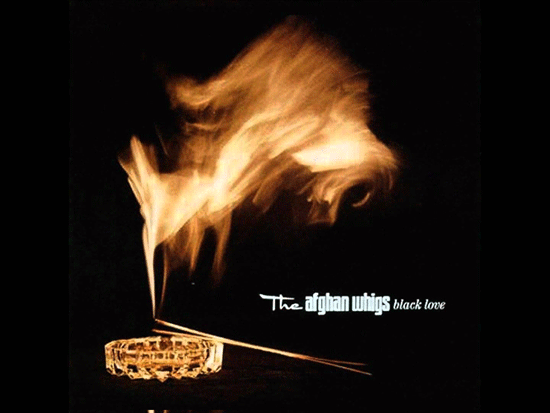
He was the Superman Lover of the indie scene, he kept his mirror clean, he was the best faux-Satan that you’d ever seen: Greg Dulli was pretty much the prototype for every cool-stroke-tough guy who started a band in the 1990s, blending equal portions of literate braininess, louche stylishness and cynical devil-may-careness like a highly potent alt-cocktail, then stirring with a smirk before throwing the whole thing down in one brawny gulp. Long before TSOL’s Jack Grisham tried to convince us through his memoirs that he was evil incarnate, Dulli was doing a damn fine job of proving his resident evil on the reg, stealing America’s girlfriends, fighting America’s barflies and generally making a mess of every town his Afghan Whigs visited as they toured up, down and around the States with their uniquely funky hybrid of alt-rock grit and junk-funk grime. Having wowed the critics and spooked prospective mating partners with the borderline-psychotic musings of 1993’s Gentlemen (an album obsessed with sex, betrayal and the aftermath that would absolutely get my vote for album of the decade), Dulli sank into a deep depression, emerging from this period with an album concept that started its life as a film-noir script and soundtrack before mutating into the underloved and misunderstood Black Love by the time of its release in 1996.
Like its predecessor, Black Love is meant to be listened to in one go: a true album (remember those?) with a narrative arc that picks up where the broken Gentlemen leaves off before pivoting its thematic intentions toward the altogether darker seediness, crime and revenge that dominates its songs, a feature-length dramatic experience that finally brought Dulli’s shot-on-location cinematic pretenses fully to the fore. Indeed, the album’s opening gambit, “Crime Scene Part One,” starts as something of a flashback, with the track’s protagonist pondering a particularly evil deed before beating it out of town for good, asking somewhat metaphorically, “Do you think I’m beautiful? Or do you think I’m evil?” before embracing the complexity of both in a single, deeply flawed human form. The rest of the album contains some of the funkiest work the Whigs ever committed to tape, with jams such as “Bulletproof,” “Going To Town” (its acoustic-demo analog is included on the second disc of 20th-anniversary outtakes, creating an—if possible—even more menacing take on Dulli’s original storyline), the Stevie Wonder-clavinet-flexing “Blame, Etc.” (a song based on the life of singer David Ruffin) and the extra-tough “Honky’s Ladder” providing the apotheosis of Dulli’s vision: roughhouse rock that could also roll like his favorite Motown R&B.
Dulli could outwrite nearly every one of his peers—Black Love‘s lyrics read on paper like dialogue lines from a George Pelecanos novel—and demonstrate just how steeped he was in the noir physics of novelists such as James Ellroy and films like Blood Simple and Hollywood Babylon. But he was also unafraid of using his perfectly imperfect vocal instrument to give voice to vulnerability on tracks such as the sublime “Step Into The Light,” a fearless, twilight acoustic ballad flaunting lines like, “The drug of your smile has gone/And left me alone.” Dulli was a tough guy who’d done a whole lotta wrong but was self-aware enough to admit to and maybe even rue the damage done, if perhaps proving genetically incapable of preventing it from tripping him up again.
The album flopped commercially and eventually resulted in a label fight that saw the Whigs wrap up their career on a different imprint, having sued Elektra for neglect and dishonesty (see 1965‘s “Neglekted,” which came out on Columbia, for details). God knows they nearly died trying; the band opened for Neil Young and Aerosmith, made any number of TV appearances and basically did everything you’d expect a band to do that believed in the pure power of its gifts and the cleansing properties of the live setting in which to get its strut on in front of its people. To see the Whigs in their prime was to witness one of the finest live acts of their or any generation, an improv machine as likely to cover Pink Floyd’s The Wall or half the Prince catalog as play the songs you expected them to on any given night.
Their fifth album’s reissue—which includes nine unreleased tracks in addition to Black Love‘s original 11—is perhaps the period at the end of the sentence of a critical reevaluation of this unheralded beauty that has been an event-in-progress for years now, probably capped by Usher’s appearance with the Whigs at SXSW in 2013 in which several of these tracks were played and the band’s R&B cred forever signed, sealed and delivered. The reissue celebration will continue when the band performs Black Love in its entirety at two special upcoming benefit shows with tragic underpinnings: Dulli’s longtime friend and guitarist, Dave Rosser, has been diagnosed with inoperable colon cancer, and the December shows in L.A. and New Orleans are intended to raise money for Rosser’s medical treatment. “A lie, the truth/Which one shall I use?” This is a line that keeps popping up throughout various tracks on Black Love, and in retrospect it’s clear that no-one could make better and more confusing use of either end of the factual spectrum than Greg Dulli. This album may not be the Whigs’ best, but I can guarantee it’s the one you’ll want to get down to at the Apocalypse Party at the end of the world.
—Corey duBrowa





